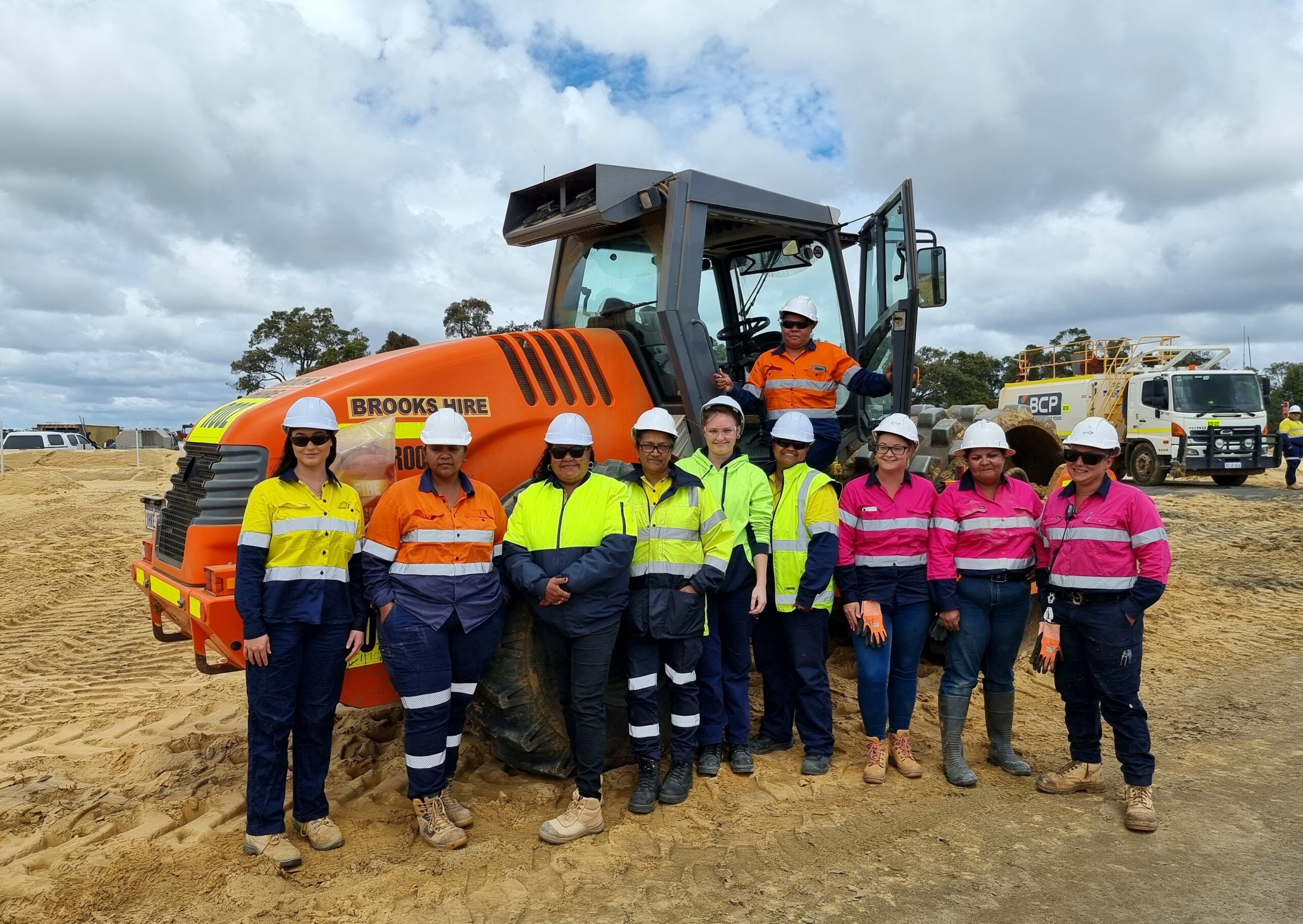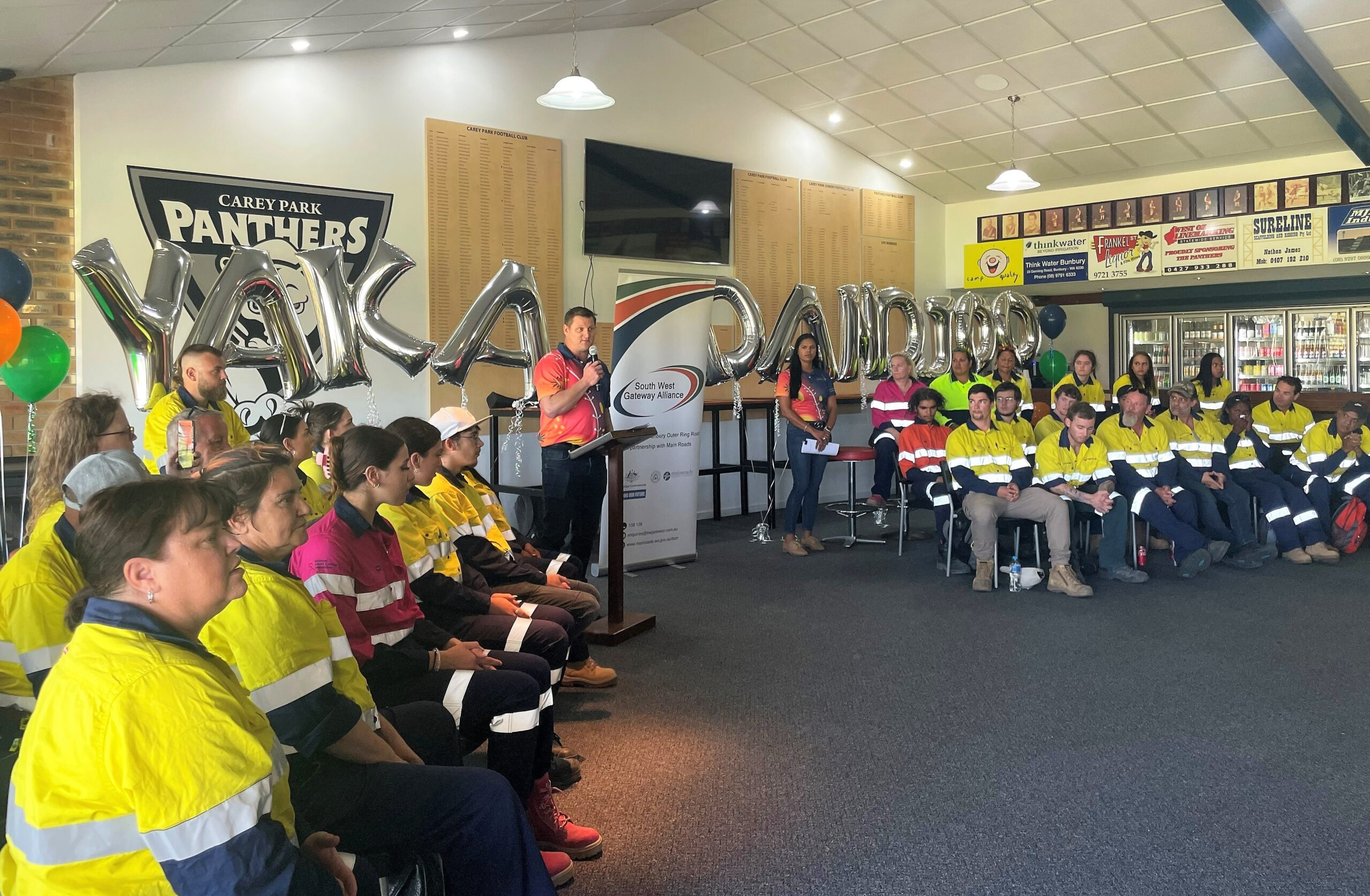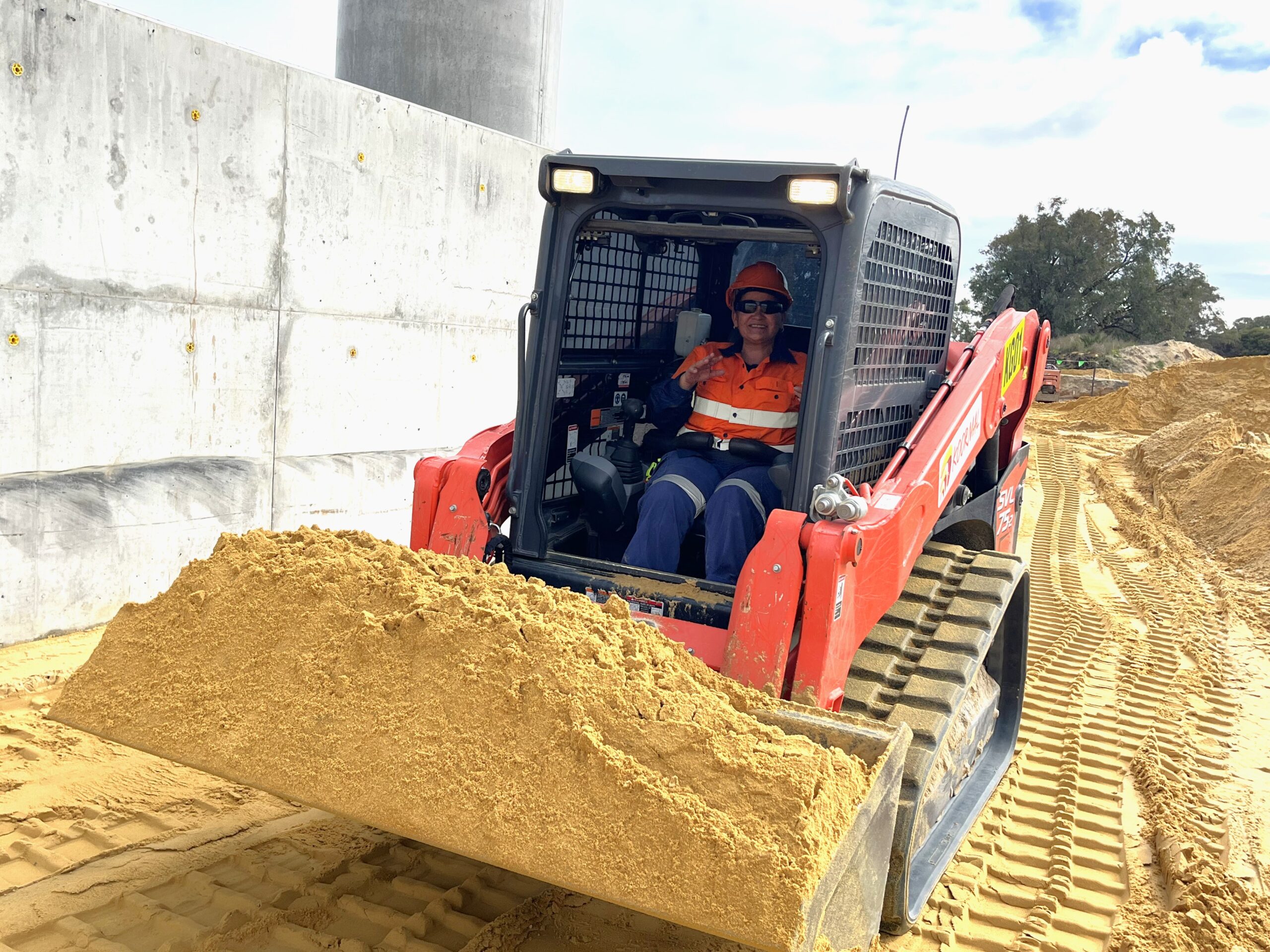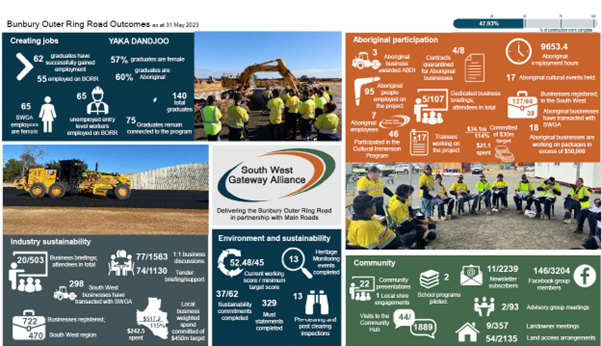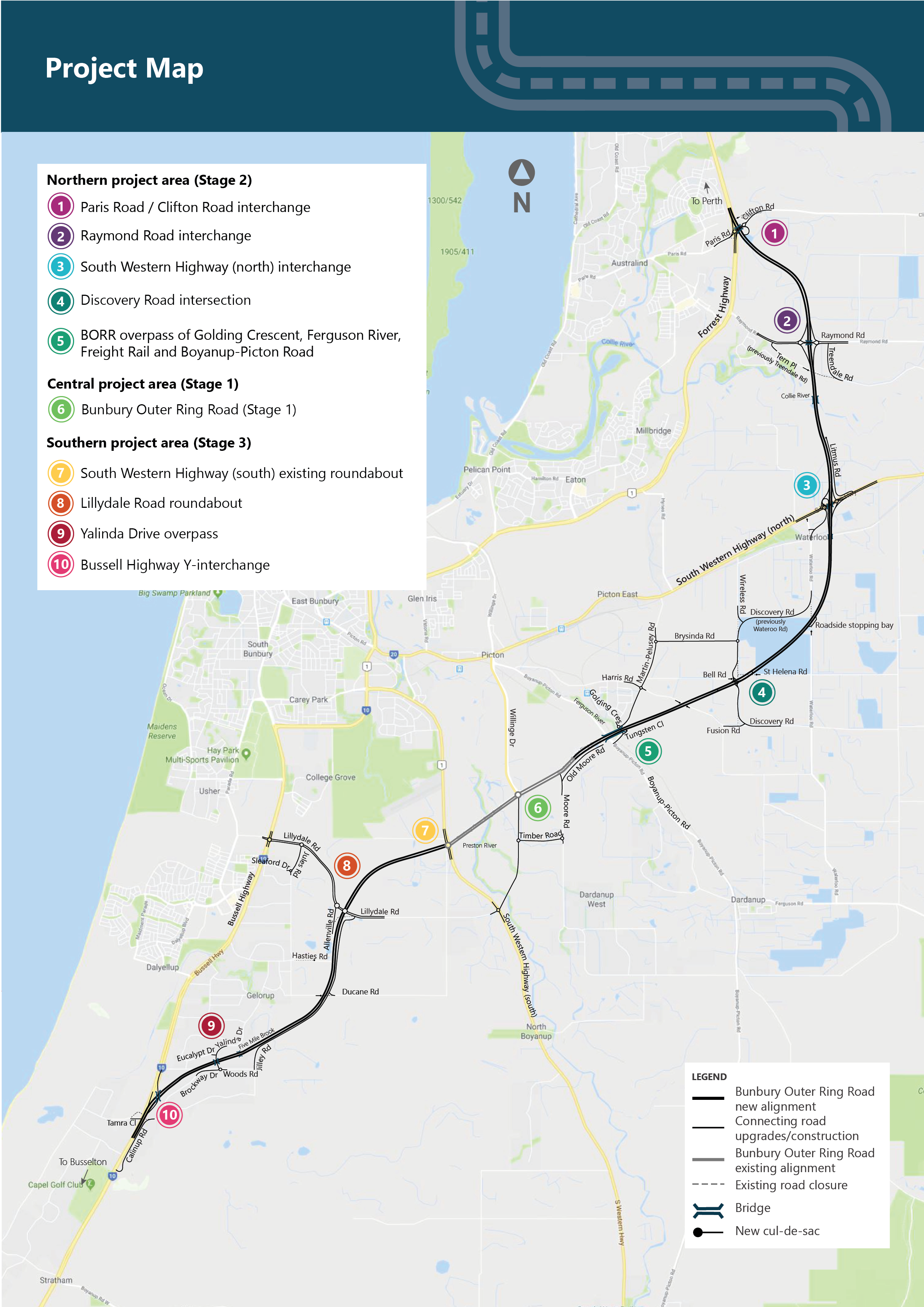Bunbury Outer Ring Road (BORR) – Social Outcomes
Describe WHAT you have done and HOW you have done it.
South West Gateway Alliance (SWGA), in partnership with Main Roads WA, is delivering the transformational infrastructure project, Bunbury Outer Ring Road (BORR). This $1.25 billion project will provide significant benefits to the region, including road safety, freight efficiency and improved access to the local port and the South West region. The project is also enabling an investment in the ongoing legacy of the local region through the creation of local jobs, business opportunities and support for ongoing local economic growth.
The project’s key initiative is the implementation of an industry sustainability employment program designed to ensure long term employment opportunities for defined demographics, including Aboriginal people, female workers, mature jobseekers (45+), young jobseekers (16-24) and trainees. SWGA has worked closely with key industry partners to identify the needs of and support entry level employment for jobseekers who are new to the industry, as well as meet the key result areas of the project, including Aboriginal participation and employment, including traineeships.
The ‘Ready for Work Program’ was developed to create a pipeline of work-ready jobseekers who remain in the construction industry with sustainable employment pathways. The program was designed specifically for the high volume and imminent requirements for labour by SWGA and complements the broader government-funded Infrastructure Ready Skill Set program.
The program, referred to as the Yaka Dandjoo program (meaning ‘working together in Noongar), has partnered with South Regional TAFE to upskill jobseekers in accredited training, such as the Infrastructure Ready Skill Set (with optional additions like the heavy haulage program). Additional training opportunities are also considered including roller operations and traffic management.
A vital component of the program is to effectively break down barriers for unemployed individuals returning to employment, including a focus on relevant minority demographics. The program includes life skills and job education components, a two-week unpaid work experience to provide exposure to a live construction site and its safety requirements and, through partnership with Group Training Organisations (GTO), participants are empowered to address known challenges and demands a return to work after extended periods of unemployment or lack of employment history.
Upon graduation, participants are supported into employment related to the BORR or other civil employment, with an emphasis on apprenticeships and traineeships. To ensure a positive legacy and long-term socio-economic health for the region, Superintendents and Supervisors are progressed through a comprehensive development program to develop relevant skills and cultural awareness. BORR workers are continuously upskilled, where possible, to promote sustainability, meet project demands and fill in labour shortages.
For many participants, the program has offered them their first lifetime opportunity to seek employment and receive life-changing industry-competitive remuneration.
What were the OUTCOMES and how were those outcomes shared?
SWGA’s employment program has achieved numerous local employment outcomes and changed the lives of its participants by “setting them up for life”. Through the building of individual capabilities for industry-specific skillsets, participants gain the necessary skills, experience, knowledge, and confidence to continue their employment journey sustainably beyond the scope of the BORR project.
Measurable outcomes since the program launch in September 2021 include:
- 140 program graduates
- 60% of all graduates being female.
- 60% of all graduates being Aboriginal people.
The program, designed during the high unemployment rates because of the COVD pandemic, meant that participants were largely either long term unemployed or never employed. Since graduation, 75 graduates have engaged in employment connected to the BORR project, with many being employed for 12+ months and 20% engaged in traineeships and apprenticeships.
These outcomes in breaking the cycle of long-term unemployment have significantly benefitted not just the participants of the program but their families, dependents, and wider community network. Benefits include:
- Improved financial security
- Improved independence including reduced dependence on government systems and agencies
- Increased self-esteem and confidence
- Enhanced resilience
The program offers participants psychological and cultural safety, as well as physical protection, by providing a safe environment in which to engage the program. The positive influence on family members after a participant has found employment has meant that the program has even supported entire family units (cross-generationally) in breaking the cycle of long term or never employed individuals.
Testimonials
To illustrate how the Yaka Dandjoo program is transforming lives, the following testimonials have been published with the participants’ permission. Sharing their stories illustrates the worth of this program to internal and external stakeholders and equally provides motivation for new participants.
Tara:
Tara, a 43-year-old mother of five children and local Wadandi/Yamatji Noongar woman, joined the program in November 2021, with no previous work history. Tara was upskilled in both roller and dump truck operations and on graduation was employed to work on the BORR as a roller operator. Her son and husband also completed the Yaka Dandjoo program and were employed in connection with the BORR. Tara has remained in her employment for 18 months and has been upskilled in water cart operations and is now a permanent full-time employee of Maca Civil. One of the highlights for Tara during this time was when she purchased an eight-seater vehicle for her family.
“I learnt to not live in the past, but to live and look forward to our future dreams which can come true. It just takes hard work, dedication, faith, support, and love. No one knows what tomorrow brings, but I just take one day at a time, and I am so thankful to be where I am today.” - Tara
Joanna:
Joanna is a 26-year-old local Wadandi Noongar woman who commenced the program in September 2022. Joanna started the program with no previous employment history or career aspirations. Her mother Carlene agreed to attend the program so that Joanna had the confidence to do so as well. During the program, Carlene realised she also had a real opportunity for employment, and together they supported each other to finish the program. Upon completion, Carlene was offered employment as a roller operator on the BORR project. Joanna commenced an apprenticeship in civil construction and is currently operating a roller on the BORR project. Both of their journeys have inspired other family members to engage in the program including Joanna’s brother, sister, and cousin.
“When I started the Yaka Dandjoo program, I had no idea I would end up where I am today. I have my first job working on the Bunbury Outer Ring Road, and I wouldn’t change it for the world. I am so thankful I got given such a wonderful opportunity.” - Joanna
Outcomes of the program have been shared through:
- Formal graduation ceremonies/events to celebrate participants’ success.
- Project update publications such as the Projects Initiatives News | Main Roads Western Australia
- News coverage in local media e.g., The West
- Social media posts e.g., Facebook
Describe WHO benefited from your initiative, innovation, or approach?
SWGA’s employment program was designed to benefit core demographic and diversity target groups including Aboriginal people, female people, mature jobseekers (45+), younger people (16-24), and trainees. To ensure these target groups benefited, additional modules, (i.e., The Thrive Program) were developed and risks for poor training outcomes were identified and mitigated.
Beneficiaries of the program also include those overcoming barriers to employment participation, such as individuals with:
- No prior work experience in entry level employment positions.
- Poor literacy and numeracy skills.
- Mental health issues, substance use and physical health conditions.
- Past negative experiences (injury, harassment, bullying, discrimination) in the workplace – leading to heightened feelings of being unsafe in the work environment.
- A lack of minimum documentation requirements such as identification, driver’s license, and other licenses such as the Construction Industry Card (White Card).
- Criminal records and/or a history of imprisonment.
- Unstable social circumstances, such as housing insecurity.
- Financial hardships.
- Lengthy periods out of the workforce to raise children or care for other family members
- No access to the internet and outdated job search skills including no current resume or referees.
The inclusive culture created by placing a high value on the outcomes of the program is evidenced in a positive trend in our workforce participation statistics (as of April 2023):
- Gender diversity*: Female: 28%
- Unemployed entry level workers: 9.52%
- Aboriginal Origin: 7%
*By comparison SWGA sourced the proportion of females employed in construction in the Bunbury area, during the first quarter of 2023. Statistics provided by Jobs & Skills WA (Dept of Training and Workforce Development) showed the percentage of females in construction in Bunbury to be 18 %. As a benchmarking measure, the SWGA female participation is significantly higher (10%).
All participants are supported by suitably skilled and empathetic trainers, supervisors, and mentors, who are in turn supported by the organization, to develop the coping strategies and life changing shills required to gain industry knowledge, skills, and competency.
The Thrive Program benefits individuals by setting them up for success in the next chapter of their life. The four-day program includes modules such as:
- Goal setting
- Building confidence
- Resilience
- Unconscious bias and diversity
- Health and mindset
- Self-care and wellbeing
- Communication skills and respectful conversations
- Work life balance and integration
- Values
- Mentoring
- Workplace safety
- Thriving in the future
The development of a safe, trusting supportive environment for trainees has ensured a high retention rate for the program.
What LEGACY and UN SDG CONTRIBUTION was achieved?
This legacy program has already provided measurable socio-economic benefits to the local South West community and will continue to do so long after the project is completed. The emphasis placed on the “post placement” component of the program will ensure participants are supported with long term employment opportunities.
Significant resources have been directed to this objective and the program has been working with local GTOs to explore additional considerations with the participants during their journey, including:
- Further career development opportunities and connections beyond their current work on the BORR project.
- Relocation capacities and the level of desire to mobilise to meet known and future labour market opportunities.
- Identified transferrable skills which would enable the participant to enter into similar and related industry roles.
The Yaka Dandjoo program and its initiatives have provided several significant socio-economic benefits, that are over and above the initial key targets and measures. For many of the participants there has been a measure of “substantial gain” that is not captured in raw program statistics alone. For many participants this has included:
- Improved mental health and fitness.
- A greater connection to their community and greater capacity to participate in a wider range of activities and groups.
- Financial independence, including the ability to provide for oneself and others.
- Improved living circumstances, housing reliability and security.
- Improved confidence and social relationships.
- Enhanced wellbeing and self-actualisation.
- Participation in further learning/training.
There is an opportunity to capture the socio-economic benefits through longitudinal studies and implementing surveys along the employment journey.
The program has achieved a higher participation in the workforce of diversity groups and set a benchmark for other participating employers regarding how to deliver and support effective training and employee retention programs. In addition, the employment and training sector stakeholders in the region, in Perth and elsewhere have taken a keen interest in the success of the Yaka Dandjoo program and see its outcomes as evidence of a training model other industry partners could adopt and build on.
To better understand the wider societal impact, we referred to the “Australian Priority Investment Approach to Welfare: 30 June 2020 Valuation Report”. According to the report, lifetime costs of income support for those of working age is $268,000 and rent assistance is $134,000. When a program participant is empowered and enabled to divert from a lifetime of income support and towards independence, these numbers indicate substantial saving potential. Moreover, there is a significant flow-on effect for participants’ dependents and other family members who similarly learn to navigate the pathways towards employment based on their exposure to the program.
[embed]https://vimeo.com/845811864/774278bd0c?share=copy[/embed]

